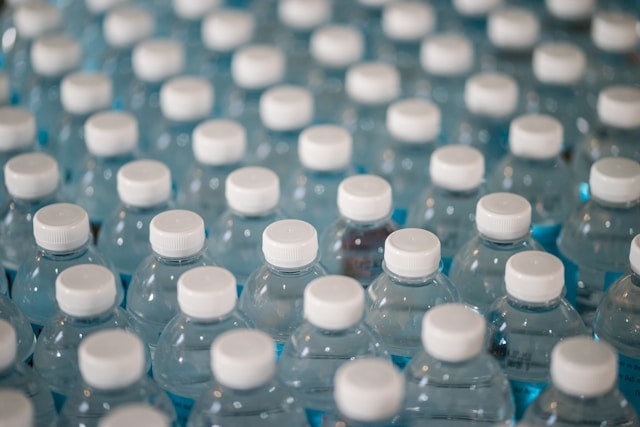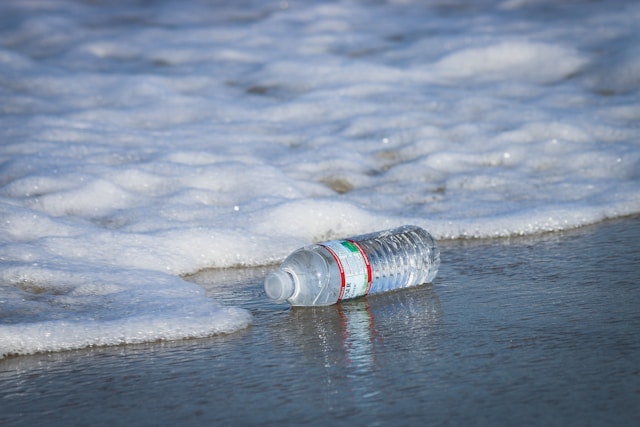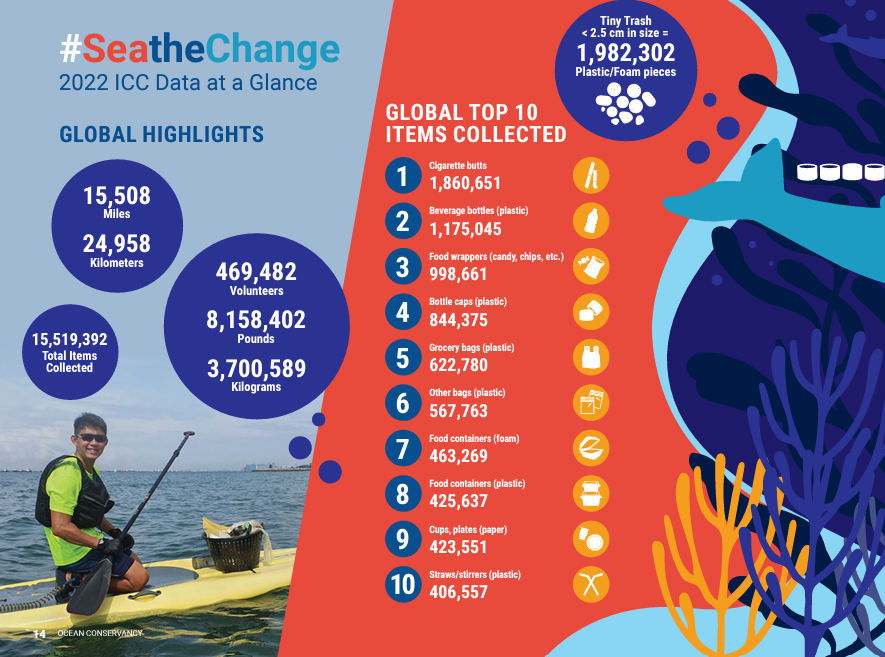Drinking Water
Tap Water or Bottled Water
Is tap water safe to drink? Should I buy bottled water? The answer: it depends.
Drinking water regulations address tap water delivered through community water systems. Public systems must test water on a specified basis in accordance with state and federal safe drinking water regulations. Most tap water provided by these systems is more regulated than bottled water. Some parameters like "forever chemicals" and microplastics may not be tested in drinking water or bottled water if not required by regulation.
"Forever chemicals" include a class of chemicals collectively known as per- and polyfluorinated alkyl substances (PFAS) and potentially other chemicals yet to be researched that persist in the environment for decades.

Bottled water may be packaged straight from a public system or ground water such as a spring. The processing of water for bottling - removing and adding minerals, making the bottles, labeling, storing and transporting the bottles adds a cost over regular tap water. Bottled water is more expensive than tap water. Plastic water bottles contribute to litter in our communities, the ocean, and landfill waste.
Tap Water in the Pikes Peak Region


Most of the drinking water in the Pikes Peak Region originates in the Rocky Mountains as snowmelt. It is delivered through a complex system of reservoirs and pipelines. Some water processed for drinking also comes from water collected in aquifers underground and local reservoirs. Surface and ground water is treated to meet drinking water standards and delivered to our homes and businesses. After the water is used, the wastewater is collected, treated, and emptied or discharged into Fountain Creek.
Precipitation falling on the ground or tap water used for lawns and gardens soaks in and provides water for plants and collects in aquifers. Water that does not percolate into the soil runs off into local waterbodies collecting dirt and pollutants as it flows.
Downstream users take water out of creeks and rivers for their drinking water. Communities utilize similar systems for treating, storing and delivering drinking water for their customers. Farmers and ranchers take the water directly out of Fountain Creek and other streams for agriculture - livestock and irrigating crops.
Some residential, commercial, and agricultural users also depend on ground water for their drinking water, with or without filtration or other individual treatment systems. Pollutants in aquifers may orginate naturally from geologic formations or from human activities.
Utility companies are required by state and federal Safe Drinking Water Regulations to prepare an annual water quality report. The regulations require certain water quality parameters to be sampled, tested, analyzed and reported to the public. The links below provide access to the water quality reports for these providers.
- Colorado Springs Utilities Water
- Fountain Utilities
- Pueblo Water
- Widefield Water and Sanitation District
Those with household wells used for drinking or livestock may wish to have the water sampled and tested periodically to determine the level of contamintion, if any.
PFAS has been identified as a contaminate in water supplies in our area.
- Per- and polyfluoroalkyl substances (PFAS) are a group of man-made chemicals that includes PFOA, PFOS, GenX, and many other chemicals. PFAS have been manufactured and used in a variety of industries around the globe, including in the United States since the 1940s. PFOA and PFOS have been the most extensively produced and studied of these chemicals. Both chemicals are very persistent in the environment and in the human body – meaning they don’t break down and they can accumulate over time. There is evidence that exposure to PFAS can lead to adverse human health effects.
- For more information, please visit the Environmental Protection Agency's webpage on Per-and Polyfluoraoalkyl Substances (PFAS), Feb 8, 2024. Retrieved 02/22/2024
Resources concerning PFAS and other chemicals::
- "PFAS: The Forever Worry", The Institute for Science & Policy, Aug 8, 2024
- Health department finds dangerous PFAS chemicals in Pueblo water. Here's what to know, Pueblo Chieftain, Aug 6, 2024
- Pueblo health department announces results of PFAS testing, 11News KKTV, Aug 1, 2024
- Proposal to List Nine Per- and Polyfluoroalkyl Compounds as Resource Conservation and Recovery Act Hazardous Constituents, US Environmental Protection Agency, Feb 8, 2024
- PFAS and Your Health, Colorado Department of Health and EnvUronment
- PFAS Research in the Fountain Valley Communities, Colorado Study of Community Outcomes (CO SCOPE) Retrieved 02/22/2024
- "Forever chemicals found in Colorado Springs Water", The Gazette, Feb 26, 2024
Bottled Water
Bottled water may be the best choice for homeowners and businesses that have historically used groundwater wells for drinking water. Groundwater may become contaminated by minerals or pollutants that makes it taste bad or be unhealthy if not treated. Bottled water might be a good drinking water option for people with residential wells in lieu of more expensive treatment methods, if needed.

It is a good idea to keep tap or bottled water on hand for use during water emergencies or disasters where water systems are damaged or incapacitated. Remember to replensih your supplies after a few months to keep the water fresh and suitable for drinking. Use it for watering plants or other non-drinking purposes rather than putting it directly down the drain.
Always recycle empty single-use water bottles. Beverage [and food] containers should be emptied and rinsed before recycling them. Dispose of bottle caps with landfill trash. Plastic beverage containers comprise a significant amount of waste collected during our Creek Week and Great American Cleanup activities. Litter, like plastic containers, can ultimately flow downstream to the Gulf of Mexico and contribute to ocean pollution.

Resources conserning bottled water:
- Study Shows Nearly 64% of Bottled Water in America is Just Tap Water: Here’s the Brands, msn.com, May 23, 2024
- Microplastics in bottled water might be a big deal, Pueblo Chieftain, Mar 2, 2024
- Which is better: Bottled water or tap water?, Medical News Today, Jan 3, 2020. Retrieved 02/18/2024
- Bottled Water Everywhere: Keeping It Safe, US Food and Drug Administration, Apr 22, 2022. Retrieved 02/18/2024
- Bottled Water Basics, US Environmental Protection Agency, Sep 2005. Retrieved 02/22/2024
- Ground Water and Drinking Water, US Environmental Protection Agency, Feb 1, 2024 Retrieved 02/18/2024
- Researchers find a massive number of plastic particles in bottled water, National Public Radio, Jan 10, 2024. Retrieved 02/18/2024
- Occurence of Microplastics in Tap and Bottled Water; Current Knowledge, National Library of Medicine, National Center for Biotechnology Information, Apr 26, 2022. Retrieved 02/18/2024
- #SeatheChange, Ocean Conservancy, 2023 Report. Retrieved 02/20/2024
Additional information about drinking water to help inform your decision.
- Is tap water safe to drink? Here's what you really need to know, National Geographic, Mar 20, 2023. Retrieved 02/18-2024
- Drinking Water Quality: What you Need to Know, Web MD, Sep 27,2022. Retrieved 02/18/2024
- Is Drinking Water Safe? US Environmental Protection Agency, Dec 27, 2023. Retrieved 02/18/2024
- Drinking Water: Protect Yourself at Home, Centers for Disease Control and Prevention, Feb 10, 2022. Retrieved 02/18/2024
- Where Does Bottled Water Come From?, Hobart M. King, geology,com (n.d.). Retrieved 02/18/2024
- A Guide to Plastic in the Ocean, National Ocean Service, National Oceanic and Atmospheric Administration, (n.d.) Retrieved Feb 2024
- Everything you need to know about plastic pollution, UN environment programme, Apr 25, 2023 Retrieved Feb 2024
- Top Ten Plastic Items Found on US Beaches: Estimating US Consumption of Beach Litter Items, DSM Environmental Services, Inc, August 2022 Retrieved Feb 2024
Linked Documents and Third Parties
Please note that this site may link out to third-party websites that do not have accessible content. This site may also include documents provided by third parties. While we cannot control the accessibility of content provided by third parties, we are happy to assist any member of the public with reading and accessing content on our site. The Compliance Coordinator may be contacted at fcwdaa@gmail.com.
